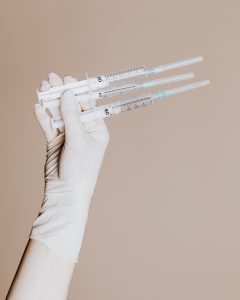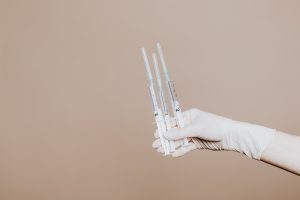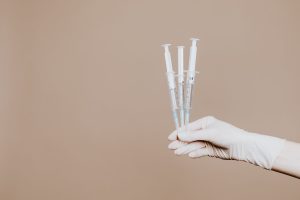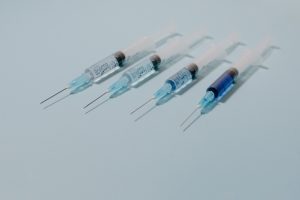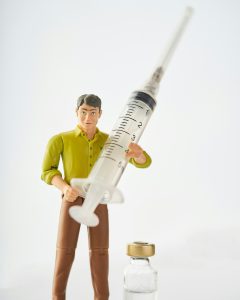
- What Is Sildenafil Citrate?
- Brief History of Sildenafil Citrate
- How to Use Sildenafil Citrate?
- What Should Be Done If an Overdose Occurs?
- To Whom Is It Contraindicated?
- Interactions with Other Medications
- Available Forms
- Famous Sildenafil Citrate Brands
- Why Do People Use It In Sports?
- Websites and Articles to Delve into the Benefits of Sildenafil Citrate
- Disclaimer
What Is Sildenafil Citrate?
Sildenafil citrate is a medication widely recognized for its role in treating erectile dysfunction (ED) and pulmonary arterial hypertension (PAH). Marketed under various brand names, such as Viagra, it belongs to a class of drugs called phosphodiesterase type 5 (PDE5) inhibitors.
In the context of ED, sildenafil citrate works by enhancing blood flow to the penis during sexual stimulation. It inhibits the enzyme PDE5, which typically breaks down a substance called cGMP. Elevated cGMP levels relax and dilate the blood vessels in the penis, allowing increased blood flow and facilitating the achievement and maintenance of an erection.
For the treatment of PAH, sildenafil citrate acts by dilating the pulmonary arteries, reducing the workload on the heart. This helps improve exercise capacity and delay disease progression.
It is crucial to note that sildenafil citrate should be used under the guidance of a healthcare professional, as it may interact with certain medications and is not suitable for everyone. Common side effects may include headaches, flushing, and digestive issues. Individuals with cardiovascular conditions or those taking nitrates should exercise caution and consult with a healthcare provider before using sildenafil citrate.
Brief History of Sildenafil Citrate
Sildenafil citrate, known by its brand name Viagra, has a fascinating history marked by accidental discoveries and revolutionary developments in the field of medicine. Initially, sildenafil was investigated for its potential as a treatment for hypertension and angina pectoris, a form of chest pain associated with coronary heart disease.
In the early 1990s, pharmaceutical company Pfizer was conducting clinical trials for a drug aimed at treating high blood pressure and angina. However, during the trials, researchers observed an unexpected side effect – an increased frequency of erections among male participants. Recognizing the significance of this unintended outcome, Pfizer redirected its focus and began exploring sildenafil as a treatment for erectile dysfunction (ED).
In 1998, the U.S. Food and Drug Administration (FDA) approved sildenafil citrate as the first oral medication for the treatment of ED. This approval marked a groundbreaking moment in the field of men’s health, offering a non-invasive and effective solution for a condition that previously had limited treatment options.
Viagra quickly gained widespread popularity and became a cultural phenomenon. Its introduction transformed the way society approached discussions about sexual health and opened up new possibilities for those experiencing ED. The success of Viagra also prompted further research into the development of similar medications for ED.
While sildenafil citrate is widely recognized for its role in treating ED, it has also found applications in other medical areas. In 2005, the FDA approved a lower-dose version of sildenafil for the treatment of pulmonary arterial hypertension (PAH), expanding its therapeutic use.
The discovery and development of sildenafil citrate stand as a testament to the unpredictable nature of scientific inquiry, where a chance observation can lead to groundbreaking advancements in medicine. Today, sildenafil and its counterparts continue to play a crucial role in enhancing the quality of life for individuals facing conditions like ED and PAH.
| Year | Event |
|---|---|
| 1990 | Sildenafil investigated for hypertension and angina. |
| 1992 | Clinical trials reveal unexpected side effect – increased erections. |
| 1998 | U.S. FDA approves sildenafil citrate as the first oral medication for Erectile Dysfunction (ED). |
| 2005 | FDA approves lower-dose sildenafil for the treatment of Pulmonary Arterial Hypertension (PAH). |
| Present | Sildenafil and its counterparts continue to be crucial in treating ED and PAH, transforming the landscape of men’s health. |
How to Use Sildenafil Citrate?
Using sildenafil citrate properly is crucial for its effectiveness and safety. Here are general guidelines on how to use sildenafil:
- Prescription Requirement:
- Sildenafil is a prescription medication, and it should only be taken under the guidance of a healthcare professional. A doctor will assess your health, medical history, and potential interactions with other medications before prescribing sildenafil.
- Dosage:
- Follow the prescribed dosage recommended by your healthcare provider. The typical starting dose for treating ED is 50 milligrams, but your doctor may adjust it based on your response.
- Timing of Consumption:
- Take sildenafil approximately 30 minutes to 1 hour before anticipated sexual activity. The drug is usually effective for up to four to six hours, but the timing may vary.
- Empty Stomach vs. With Food:
- Sildenafil can be taken with or without food. However, taking it with a high-fat meal may delay its onset of action.
- Avoid Alcohol and Grapefruit Juice:
- Limit or avoid alcohol consumption when using sildenafil, as it can increase the risk of side effects. Grapefruit juice may also interact with sildenafil and should be avoided.
- Sexual Stimulation:
- Sildenafil enhances the natural response to sexual stimulation. Therefore, sexual arousal and stimulation are necessary for the medication to be effective.
- Avoiding Excessive Doses:
- Do not take more than one dose of sildenafil in a 24-hour period. Excessive doses can increase the risk of side effects and complications.
- Potential Interactions:
- Inform your healthcare provider about all the medications you are currently taking, including prescription and over-the-counter drugs, to avoid potential interactions.
- Adherence to Instructions:
- Follow your doctor’s instructions and do not alter the dosage or frequency without consulting them. If you experience any side effects or concerns, inform your healthcare provider promptly.
- Caution with Certain Conditions:
- Individuals with certain medical conditions, such as cardiovascular issues, should exercise caution when using sildenafil. Consult with a healthcare professional if you have concerns about your health status.
It’s essential to note that sildenafil is not a medication for continuous daily use. Only take it as prescribed when needed for sexual activity. If you have questions or concerns about the use of sildenafil, consult your healthcare provider for personalized advice based on your health condition.
What Should Be Done If an Overdose Occurs?
If an overdose of sildenafil citrate occurs, it is crucial to seek immediate medical attention. Overdosing on sildenafil can lead to an increased risk of experiencing severe side effects, which may pose serious health risks. Here are steps to take in case of an overdose:
- Seek Emergency Medical Help:
- If you suspect or witness an overdose, call emergency services (such as 911 in the United States) immediately. Prompt medical intervention is essential to address potential complications.
- Provide Information:
- When calling for emergency assistance, provide accurate information about the suspected overdose, including the amount of sildenafil ingested and any other relevant details.
- Avoid Delay:
- Time is critical in cases of overdose. Do not wait for symptoms to worsen before seeking medical help.
- Do Not Attempt Self-Treatment:
- Refrain from attempting to treat the overdose at home. Medical professionals are equipped to assess the situation, provide necessary interventions, and monitor for potential complications.
- Bring Medication Packaging:
- If possible, bring the original packaging of the medication to the hospital or emergency room. This can assist healthcare providers in determining the type and dosage of sildenafil ingested.
- Monitor Vital Signs:
- While waiting for emergency services, if the person is conscious and able to communicate, monitor their vital signs such as pulse, breathing, and level of consciousness. Report any changes to emergency responders.
- Provide Support:
- Offer reassurance and support to the individual while awaiting emergency medical assistance. Remain calm and encourage them to stay calm as well.
Symptoms of sildenafil overdose may include severe dizziness, fainting, prolonged erections (priapism), and other serious side effects. It is essential to communicate this information to healthcare professionals for appropriate treatment.
Remember that sildenafil citrate should be taken strictly according to the prescribed dosage, and exceeding recommended amounts can lead to adverse effects. If there are concerns about the use of sildenafil or the risk of overdose, consult with a healthcare provider for guidance and adjustments to the treatment plan.
To Whom Is It Contraindicated?
Sildenafil citrate is contraindicated (not recommended) for certain individuals due to potential health risks and interactions with other medications. Contraindications may include:
- Nitrates and Nitric Oxide Donors:
- Sildenafil should not be used in combination with nitrates or nitric oxide donors, commonly prescribed for chest pain (angina). The concurrent use can lead to a dangerous drop in blood pressure.
- Cardiovascular Conditions:
- Individuals with severe cardiovascular conditions, such as recent heart attack, unstable angina, or uncontrolled high or low blood pressure, may be advised against using sildenafil due to potential cardiovascular risks.
- Hypersensitivity or Allergy:
- People with a known hypersensitivity or allergy to sildenafil or its components should avoid its use.
- Severe Liver Impairment:
- Sildenafil metabolism occurs in the liver. Individuals with severe liver impairment may experience an increase in sildenafil levels, and its use may need to be avoided or adjusted under medical supervision.
- Severe Kidney Impairment:
- Severe kidney impairment can affect the elimination of sildenafil from the body. Dosage adjustments may be necessary, and the use of sildenafil should be monitored closely in individuals with severe kidney dysfunction.
- Retinal Disorders:
- Sildenafil may pose risks to individuals with certain retinal disorders, such as retinitis pigmentosa. It’s important to discuss any existing eye conditions with a healthcare provider.
- Prior Vision Loss:
- Individuals who have experienced vision loss in one or both eyes due to non-arteritic anterior ischemic optic neuropathy (NAION) should avoid using sildenafil, as it may increase the risk of a recurrent episode.
- Alpha-Blockers and Antihypertensives:
- The use of sildenafil with alpha-blockers or other antihypertensive medications can lead to an additive effect on blood pressure, potentially causing hypotension.
- Deformation of the Penis:
- Individuals with anatomical deformities of the penis, such as Peyronie’s disease, may be at an increased risk of complications, and the use of sildenafil should be approached with caution.
- Women and Children:
- Sildenafil is primarily intended for use in adult men and is not recommended for women or children under 18 years of age.
It is crucial to provide a comprehensive medical history to the healthcare provider before starting sildenafil therapy. Additionally, individuals should inform their doctor about all medications, supplements, and underlying health conditions to ensure safe use and to identify any potential contraindications. Always consult with a healthcare professional for personalized advice based on individual health status.
Interactions with Other Medications
Sildenafil citrate can interact with certain medications, potentially leading to adverse effects or reduced efficacy. It is essential to inform healthcare providers about all medications, supplements, and herbal products being taken to identify potential interactions. Here are some notable drug interactions with sildenafil:
- Nitrates and Nitric Oxide Donors:
- Concurrent use with nitrates or nitric oxide donors (commonly prescribed for chest pain or heart conditions) can lead to a dangerous drop in blood pressure. This combination is contraindicated.
- Alpha-Blockers:
- Alpha-blockers used to treat conditions like benign prostatic hyperplasia (BPH) or high blood pressure may enhance the hypotensive effects of sildenafil, leading to low blood pressure. Adjustments in dosage may be necessary.
- Antihypertensive Medications:
- Sildenafil can potentiate the hypotensive effects of antihypertensive medications, increasing the risk of low blood pressure. Caution and monitoring are advised.
- Protease Inhibitors (HIV Medications):
- Protease inhibitors, used in the treatment of HIV, may increase the levels of sildenafil in the blood. Dosage adjustments may be required, and close monitoring is recommended.
- Azole Antifungals:
- Azole antifungals (e.g., ketoconazole, itraconazole) can increase sildenafil levels in the blood. Dosage adjustments may be needed.
- Macrolide Antibiotics:
- Macrolide antibiotics (e.g., erythromycin) may increase sildenafil levels. Dosage adjustments or an alternative antibiotic may be considered.
- Rifampin:
- Rifampin, an antibiotic used to treat bacterial infections, may decrease sildenafil levels. Higher sildenafil doses may be necessary in such cases.
- Grapefruit Juice:
- Grapefruit juice can increase sildenafil levels in the blood, potentially enhancing its effects. It is advisable to avoid grapefruit juice while taking sildenafil.
- Guanylate Cyclase Stimulators:
- Concomitant use with guanylate cyclase stimulators (riociguat) can lead to a dangerous drop in blood pressure. This combination is contraindicated.
- Hypertension Medications:
- Sildenafil can augment the blood pressure-lowering effects of some antihypertensive medications, necessitating careful monitoring and potential dosage adjustments.
- Other PDE5 Inhibitors:
- Concurrent use of multiple phosphodiesterase type 5 (PDE5) inhibitors, such as sildenafil with another ED medication, can increase the risk of adverse effects.
It is crucial to discuss all medications and medical history with a healthcare provider to ensure safe use of sildenafil. Do not start, stop, or change the dosage of any medication without consulting a healthcare professional.
Available Forms
Sildenafil citrate is primarily available in oral form, and the most common and well-known formulation is the tablet. The tablet is designed for oral administration, usually with water, and it should be taken as directed by a healthcare provider.
While the tablet form is the standard presentation, sildenafil citrate may also be available in other formulations:
- Oral Tablets:
- Standard oral tablets are the most prevalent form of sildenafil citrate. They come in various strengths, typically ranging from 25 mg to 100 mg. The recommended dosage depends on individual health and the intended use (e.g., treating erectile dysfunction or pulmonary arterial hypertension).
- Oral Disintegrating Tablets:
- Some brands offer sildenafil citrate in an orally disintegrating tablet (ODT) form. These tablets dissolve rapidly in the mouth, making them suitable for individuals who may have difficulty swallowing traditional tablets.
- Oral Suspension:
- Sildenafil citrate may be available in the form of an oral suspension. This liquid formulation is convenient for those who may have difficulty swallowing tablets or prefer a liquid form.
- Sublingual Tablets:
- Sublingual tablets are designed to be placed under the tongue for rapid absorption. While not as common as standard oral tablets, sublingual formulations may be available in some regions.
It’s important to note that the availability of specific formulations may vary depending on the brand and the regulations of the country or region. Additionally, sildenafil citrate is primarily prescribed for specific medical conditions, and its use should always be guided by a healthcare professional who will determine the most appropriate form and dosage based on individual health needs.
Famous Sildenafil Citrate Brands
Sildenafil citrate is a widely used medication for the treatment of erectile dysfunction and pulmonary arterial hypertension. Several pharmaceutical companies market sildenafil under different brand names. Here are some well-known brands of sildenafil citrate:
- Viagra:
- Viagra is the original and most recognizable brand of sildenafil citrate. It is manufactured by Pfizer and was the first oral medication approved for the treatment of erectile dysfunction.
- Revatio:
- Revatio is another brand of sildenafil citrate, also manufactured by Pfizer. Unlike Viagra, Revatio is specifically approved for the treatment of pulmonary arterial hypertension.
- Suhagra:
- Suhagra is a brand of sildenafil citrate manufactured by Cipla, a pharmaceutical company based in India. It is commonly used to treat erectile dysfunction.
- Kamagra:
- Kamagra is a brand that offers sildenafil citrate and is produced by Ajanta Pharma, an Indian pharmaceutical company. It is known for providing an affordable alternative to Viagra.
- Caverta:
- Caverta is a brand of sildenafil citrate manufactured by Ranbaxy, an Indian pharmaceutical company. It is prescribed for the treatment of erectile dysfunction.
- Penegra:
- Penegra is another brand of sildenafil citrate produced by Zydus Cadila, an Indian pharmaceutical company. It is used to address erectile dysfunction.
- Edegra:
- Edegra is a brand of sildenafil citrate manufactured by Sun Pharmaceutical Industries, an Indian multinational pharmaceutical company. It is used to treat erectile dysfunction.
- Silagra:
- Silagra is a brand of sildenafil citrate produced by Cipla. Similar to Suhagra, it is prescribed for the treatment of erectile dysfunction.
- Filagra:
- Filagra is a generic brand that offers sildenafil citrate and is produced by Fortune Healthcare, a pharmaceutical company based in India. It is used to address erectile dysfunction.
It’s important to note that while these brands contain sildenafil citrate as the active ingredient, they may vary in terms of formulation, strength, and other inactive components. The choice of a specific brand may depend on factors such as availability, pricing, and individual preferences. Always consult with a healthcare professional before using any medication, and use it as prescribed for your specific health condition.
Why Do People Use It In Sports?
Sildenafil citrate is not a substance that is typically used for performance enhancement in sports. However, there have been some anecdotal reports and discussions surrounding the potential use of sildenafil in sports. It’s important to note that the World Anti-Doping Agency (WADA) includes sildenafil on its list of prohibited substances, and its use in competitive sports is considered unethical and against anti-doping regulations.
There are a few reasons why some athletes or individuals might consider using sildenafil in a sports context:
- Vasodilation Effects:
- Sildenafil is known for its vasodilation effects, meaning it relaxes and widens blood vessels. This property can potentially increase blood flow to certain areas of the body, including muscles. Some individuals may believe that this could enhance oxygen delivery and nutrient supply to muscles during exercise.
- Altitude Training:
- There have been discussions about the potential use of sildenafil in altitude training. The idea is that increased blood flow could help with oxygen delivery, potentially providing an advantage in endurance sports at high altitudes.
It’s crucial to emphasize that the use of sildenafil for performance enhancement is not supported by scientific evidence, and it can have serious health risks. Moreover, its use is strictly prohibited in competitive sports, and athletes can face sanctions if detected during anti-doping testing.
Athletes and individuals interested in sports performance should adhere to ethical practices and comply with anti-doping regulations. Any use of medications, including sildenafil, should be discussed with healthcare professionals to ensure safety, legality, and appropriateness for individual health conditions. Using substances for performance enhancement without proper medical guidance is not only against the rules but can also jeopardize the athlete’s health and career.
Websites and Articles to Delve into the Benefits of Sildenafil Citrate
Sildenafil citrate is a medication primarily used to treat erectile dysfunction and pulmonary arterial hypertension. Here is some information from the provided websites:
- WebMD – Sildenafil Oral:
- WebMD provides comprehensive details about sildenafil oral, including its uses, side effects, precautions, and interactions. It offers user-friendly information for individuals seeking insights into the medication.
- MedlinePlus – Sildenafil:
- MedlinePlus, a service of the U.S. National Library of Medicine, offers information about sildenafil, emphasizing its uses, precautions, and potential side effects. It is a reliable source for medical information.
- Drugs.com – Sildenafil:
- Drugs.com provides a detailed overview of sildenafil, covering uses, dosage, side effects, and interactions. It also includes user reviews and practical information for those considering or using the medication.
- Mayo Clinic – Sildenafil Oral Route and Mayo Clinic – Sildenafil Oral Route Description:
- Mayo Clinic offers comprehensive information on sildenafil, including its oral route, side effects, and a detailed description of the medication. Mayo Clinic is a reputable medical institution.
- Wikipedia – Sildenafil:
- Wikipedia provides an overview of sildenafil, covering its history, mechanism of action, medical uses, and more. While Wikipedia can offer a general understanding, it’s important to cross-reference information from other reliable sources.
- Medical News Today – Sildenafil:
- Medical News Today delivers information on sildenafil, including its uses, side effects, and potential interactions. It is a reputable source for health-related news and information.
- GoodRx – What Is Viagra (Sildenafil)?:
- GoodRx provides information on sildenafil, specifically focusing on its brand name Viagra. It includes details on uses, dosage, and potential cost savings through prescription discounts.
- ScienceDirect – Sildenafil Citrate:
- ScienceDirect offers a scientific perspective on sildenafil citrate, covering its chemical properties and applications. It is a valuable resource for those seeking more in-depth scientific information.
- Healthline – Sildenafil Oral Tablet:
- Healthline provides information on sildenafil oral tablets, including details on uses, dosage, and potential side effects. It is a trusted health information source.
- Patient.info – Sildenafil for Erectile Dysfunction:
- Patient.info offers information on sildenafil for the treatment of erectile dysfunction, including usage guidelines and potential side effects. It is a reliable patient-centered resource.
- MS Trust – Viagra (Sildenafil Citrate):
- MS Trust provides information on sildenafil citrate, specifically addressing its use in the context of multiple sclerosis. It offers insights for individuals with this medical condition.
- SingleCare – Sildenafil Citrate:
- SingleCare provides information on sildenafil citrate, including what it is and potential cost-saving opportunities through their prescription savings program.
When researching medication information, it’s advisable to consult multiple reputable sources, especially those from healthcare institutions, to ensure accuracy and reliability. Always consult with a healthcare professional for personalized advice and guidance on medication use.
Disclaimer
The information is solely provided for educational purposes. It is not intended to diagnose, treat, cure, or prevent any disease. Seek the advice of your physician or qualified healthcare provider with any questions you may have regarding a medical condition at all times. Never disregard professional medical advice because of something you have read or learned from this article.


